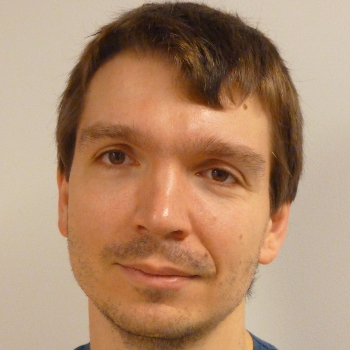
Raphael Granier de Cassagnac
Raphael is a member of the CMS collaboration, that he joined in 2010 with and ERC consolidator grant to study heavy-ion collisions and the quark-gluon plasma. In 2016, he was elected for 5 years chair of a national hiring committee in France for nuclear, particle and astropaticle physics.

Vava Gligorov
Yugoslav by origin, I have been a member of the LHCb collaboration since 2003. I obtained my PhD thesis on the study of time-dependent CP violation in beauty meson decays without seeing any data, but was thankfully able to spend most of Run 1 actually measuring time-dependent CP violation and working on LHCb’s software trigger. Since Run 2 my physics interests have shifted to studies of lepton universality, as well as developing a new GPU-based trigger for LHCb’s Run 3 data taking, which I am very much looking forward to commissioning.

Marielle Chartier
Marielle joined the ALICE Collaboration in 2013, after twenty years in low-energy nuclear physics, to start a high-energy hadron physics research programme at the University of Liverpool (UK). Her group built a significant part of the Outer Barrel for the upgrade of the ALICE Inner Tracking System, which was recently installed in the experiment. She is currently the first deputy chair of the ALICE Collaboration Board. She is experienced at securing research funding and served on various committees of scientific bodies and research councils, nationally and internationally, including as chair of the Nuclear Physics STFC E. Rutherford Fellowship panel (UK).

Deepak Kar
Deepak Kar is an associate professor at University of Witwatersrand in South Africa, working in the ATLAS experiment for the past ten years, having previously worked in CDF during his PhD. His focus is on measurements probing different aspects of QCD, jet substructure methods, searches for new physics in unusual topology and Monte Carlo event generators. He held multiple positions of responsibility inside and outside the collaboration, and has been successful in getting national and international research grants, not only for himself, but also for students he supervised. He lived in six countries spread over four continents, and travelled to 72 countries (might be 74 by the time of the workshop!).

Xiaohu SUN
Xiaohu SUN is an assistant professor at Peking University. He performed his Ph.D. on single top measurements with the ATLAS experiment at University of Grenoble. He then started BSM searches and double Higgs studies during his postdoc at CAS/IHEP, University of Alberta and University of Manchester. He is now a member of the CMS experiment and has special interests in double Higgs as well as the timing detector in the CMS Phase-2 upgrade.
Jim Hirschauer 
Jim Hirschauer is a Scientist at Fermi National Accelerator Laboratory in Batavia, IL. Jim performed his Ph.D. research with the Babar experiment at SLAC measuring time-dependent CP violation in B meson decays. In 2009, Jim joined Fermilab and the CMS experiment where his research focuses on searches for supersymmetry as well as new phenomena in dijets. From 2013-2019, Jim led the upgrade of the CMS barrel and endcap hadron calorimeters. Since 2017, Jim has worked on the CMS High Granularity Calorimeter upgrade: leading the development of the novel, radiation hard, machine learning capable ASICs that provide the first stage of on-detector data selection and compression for HGCAL.
